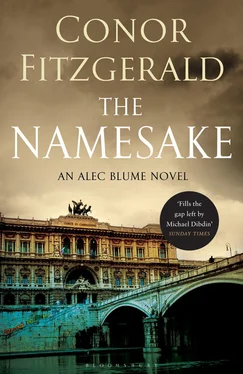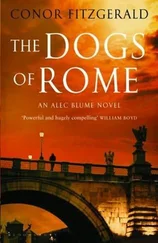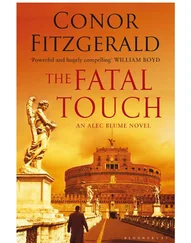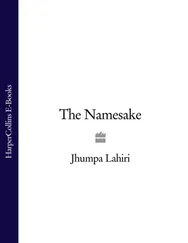Conor Fitzgerald - The Namesake
Здесь есть возможность читать онлайн «Conor Fitzgerald - The Namesake» весь текст электронной книги совершенно бесплатно (целиком полную версию без сокращений). В некоторых случаях можно слушать аудио, скачать через торрент в формате fb2 и присутствует краткое содержание. Жанр: Полицейский детектив, на английском языке. Описание произведения, (предисловие) а так же отзывы посетителей доступны на портале библиотеки ЛибКат.
- Название:The Namesake
- Автор:
- Жанр:
- Год:неизвестен
- ISBN:нет данных
- Рейтинг книги:3 / 5. Голосов: 1
-
Избранное:Добавить в избранное
- Отзывы:
-
Ваша оценка:
- 60
- 1
- 2
- 3
- 4
- 5
The Namesake: краткое содержание, описание и аннотация
Предлагаем к чтению аннотацию, описание, краткое содержание или предисловие (зависит от того, что написал сам автор книги «The Namesake»). Если вы не нашли необходимую информацию о книге — напишите в комментариях, мы постараемся отыскать её.
The Namesake — читать онлайн бесплатно полную книгу (весь текст) целиком
Ниже представлен текст книги, разбитый по страницам. Система сохранения места последней прочитанной страницы, позволяет с удобством читать онлайн бесплатно книгу «The Namesake», без необходимости каждый раз заново искать на чём Вы остановились. Поставьте закладку, и сможете в любой момент перейти на страницу, на которой закончили чтение.
Интервал:
Закладка:
Blume phoned the Palaces of Justice, found the assistant who worked with Arconti, and asked if anything had been heard from the hospital. His concern was real, but he also knew it was too early for news and that the person he called would be more interested in hearing what Blume had to say. After confirming that there was no news, the assistant said, ‘You were in the office when it happened, I hear.’
‘Yes, yes, I was. He just keeled over. Poor man. But people can come through a stroke.’
‘His files are all over his floor. What happened, did he knock them off his desk as he fell?’
‘Yes,’ said Blume. ‘He was going to show me something when it happened.’
‘It is such a pity. Any idea what he wanted to show you?’
‘It was a confession of some sort. No, that’s not quite the word he used: an admission.’
‘By who?’
‘I never found out,’ said Blume. ‘He collapsed before he could show me. I hope you’ve got those files in a safe place now.’
‘Safe?’ the sostituto sounded uncertain. ‘We have to sort through them. There’s a lot there, and some notes from another case have got mixed up. This was the investigation into the hospital consultant who committed suicide?’
‘Originally, yes,’ said Blume.
‘You’re saying there was a confession involved?’
‘I’m not saying that. Did I say confession? Arconti said something about an admission. A telephone call he transcribed. I don’t know any more than that. It’ll be in there somewhere among the mess of papers.’
The sostituto, whose voice was at once young and tired, said, ‘I hope so.’
‘By the way, in all the confusion, I left my notebook in there. Do you think I could pop round and collect it? It’s got some witness statements from a different case in it.’
‘Do you want me to see if I can find it?’
‘No, it’s all right. I’ll come round. It’s no trouble.’
He hung up before he could receive any more offers of help. The next call he made was to a reporter from Il Messaggero, a young woman — no more than a girl, really — who covered some of the cronaca nera, the local crime and bad-news section. He told her about Arconti’s collapse and the scattered files that were found in his office, omitting to mention he was there at the time. The reporter was not all that impressed until he mentioned that no one else knew about the mysterious mess in the office, which suggested that someone might have been looking for something. Her voice suddenly became chirpier and harder, her questions more direct, her gratitude for the call more effusive.
Blume sat down at his computer and began rewriting the words that he wanted Curmaci’s wife to have said. He was halfway through his first draft when his phone went. It was a reporter from the Rome section of La Repubblica. Blume hated the paper and disliked the reporter, so had some fun in being tight-lipped and uncommunicative, ending the call with an angry outburst about the police having no duty whatsoever to answer questions just because a reporter spoke about the ‘public interest’. He felt confident his comment would intensify suspicion that some sort of attempt was being made to suppress a leaked document. It would take them no more than a day to find the document and a night to construct their own journalistic fantasies around it. He was on his final rewrite of the bogus confession when a reporter from Il Corriere della Sera phoned him.
‘What’s this I hear, Alec?’
Blume gritted his teeth. He had met this man once in the flesh. It did not put them on first-name terms. ‘That depends on who you’ve been listening to.’
‘About a magistrate being hospitalized, his office ransacked.’
‘I have heard no such thing,’ said Blume.
‘A Mafia case, apparently. Ndrangheta to be precise.’
‘Nothing you can publish. No story there.’
‘Missing papers?’
‘No, nothing,’ said Blume. He hung up as satisfied as he knew the reporter was not. If past form was anything to go by, the reporter would get in contact with someone in the police who would get in contact with Agente Rospo who, not being very much in demand, had plenty of opportunity to act alone.
Blume took some scissors, cut the heading of the original transcript with Arconti’s handwriting on it, and glued it on top of his new version of the transcript. He deleted the file from the computer using the anti-virus program, which promised to overwrite it seven times, folded the original into his pocket, and made three copies on his dinky new multifunction scanner.
He took one of the copies and placed it in the middle of his desk and gazed critically at the new version of the transcript, and compared it with the old.
He had left the opening lines intact. Dottore, I appeal to you as the mother of two children. I lay out my truth before your ideals of justice, and I beg you to resist the temptation of making such hurtful, dangerous and damaging charges against my husband…
But where she had spoken of her husband being forced out of his native land, Blume made a few adjustments so that it now read:… guilty of nothing other than being a noble father and a shining example to his children who has been placed in an impossible position by the arrogance and power of the judiciary of two countries. That’s how Mafia informers usually justified themselves. He decided to keep the part about Curmaci preferring to cut his own throat, but now it read:
He would sooner cut his own throat than his ties with his beloved homeland, but nor would he ever betray the love of his wife and children whose very lives are now in danger as a result of the intolerable pressures you have brought to bear on him. My pain at his absence is intensified by the suspicion and evil mistrust of the entire town. Every man must respond to his own conscience for the sins and crimes he has committed, but the man you have described is no infame. He is an honourable man whose conscience is good and strong and whose love for his family too great. I pray that someday the people of this town will be free enough to forgive us for what they, in their ignorance, now regard as a betrayal. Allow his sincere repentance, I beg you, to save the life of two innocent children and a woman of peace… and so on.
An affiliated woman who had made a statement like that would not last through the week. He was pleased with his work. The more he read it, the better he liked it. He had turned a statement of defiance into a confession tinged with cowardice. The accusations against the town, the claim that they had no choice, the same dishonest tone, the same refusal to take responsibility for their misdeeds all struck a convincing note. It was still wheedling, still obscurantist, still bitter but, plausibly, the words of an infame, by far the worst insult in the rich Mafia vocabulary of hate and fear. The punishments for an infame were brutal. If Curmaci had any feelings for his wife or his reputation as a husband with honour, he’d have to intervene now.
Blume hid the confession in the middle of some of his papers. If the copy he was about to plant in Arconti’s office was not found, then there was a good chance this one would be.
Rospo accepted bribes from the newspapers, lawyers, unknown superiors and even rival magistrates. He was the source of half the leaks from the office and was dumb enough to think no one knew. One of the newspapers would have called him already and even for a modest sum he would hunt through Blume’s files like a truffle dog till he found whatever they had asked him to find, caring nothing for plausibility or truth.
Blume’s next stop was the courthouse, where he had no problem gaining readmittance to Arconti’s room, though accompanied by the sostituto, a young man with a wispy beard and round glasses, who looked like some early-twentieth-century radical. Gramsci, maybe.
Читать дальшеИнтервал:
Закладка:
Похожие книги на «The Namesake»
Представляем Вашему вниманию похожие книги на «The Namesake» списком для выбора. Мы отобрали схожую по названию и смыслу литературу в надежде предоставить читателям больше вариантов отыскать новые, интересные, ещё непрочитанные произведения.
Обсуждение, отзывы о книге «The Namesake» и просто собственные мнения читателей. Оставьте ваши комментарии, напишите, что Вы думаете о произведении, его смысле или главных героях. Укажите что конкретно понравилось, а что нет, и почему Вы так считаете.












